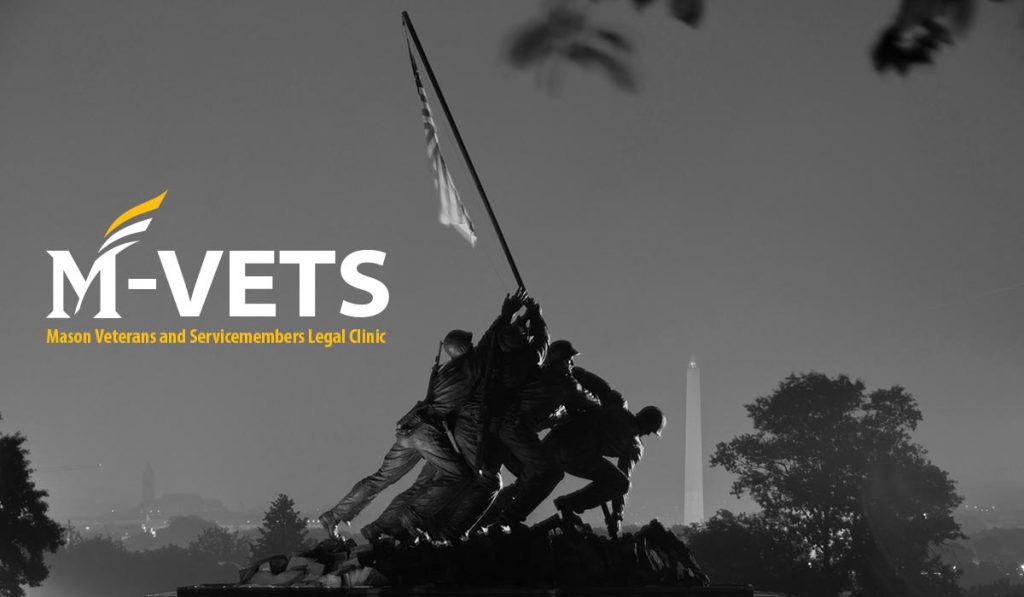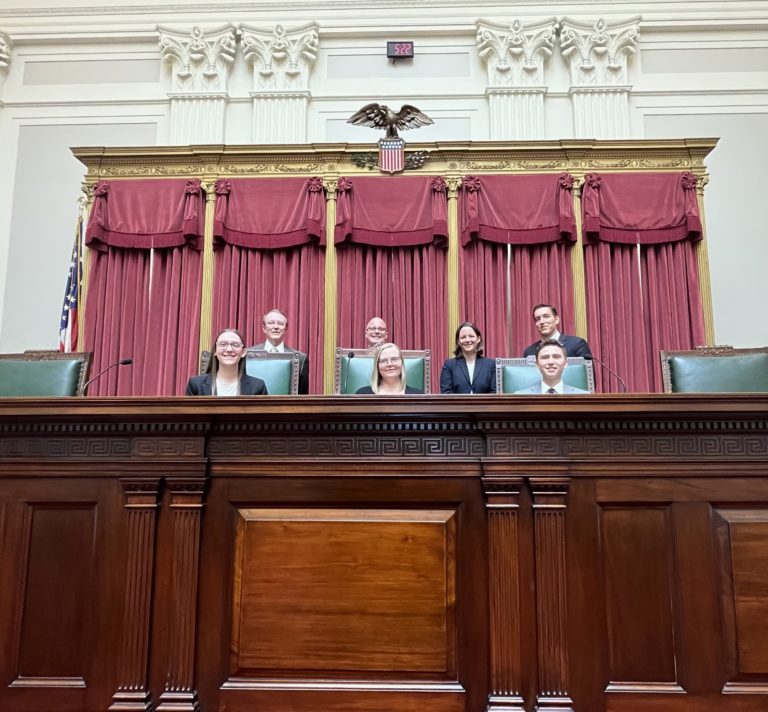DIRECTOR’S GREETING:

Continuing its vital work in the military community, M-VETS marked 2022 with several clinic milestones and long-awaited case decisions. Completing over 3,000 hours of legal work in 2022, M-VETS surpassed the $5 million mark in private market value of client services rendered since its inception in 2004. Significant case victories provided financial relief to clients, access to vital benefits, and strengthened the bonds of familial relationships. In addition, M-VETS continued to prepare for the opening of its new outpost located at the newly renovated American Legion Post 139 in Arlington. With the upcoming addition of a third staff attorney, M-VETS will begin to provide walk-in legal services at its new office location in 2023. We sincerely appreciate the support from our sponsors and community partners in making this expansion possible. We also give a heartfelt thank you to all our student-advisors and administrative support staff for their continued support of the M-VETS mission. We wish our students, alumni, colleagues, supporters, and the entire military community a Happy New Year and best wishes for a productive 2023!
MILESTONES:
Since its inception in 2004 and through the dedicated effort of over 200 student-advisors, M-VETS has served nearly 400 clients and provided the equivalent of $5.1 million in pro bono legal services. M-VETS provides free legal representation to veterans, active duty service members, and their families while allowing law students to gain practical legal experience under the supervision of practicing attorneys. M-VETS provides representation in a variety of matters including Virginia civil litigation matters, uncontested divorces, consumer protection matters, wills and powers of attorney, as well as assisting with matters before the VA and various administrative boards, including discharge upgrades, record corrections, military pay and entitlement matters, and VA disability benefit appeals.
M-VETS EXPANSION NEWS:

The newly renovated American Legion Post 139 opened in 2022 in the new Lucille and Bruce Terwilliger Place, an affordable housing apartment complex with dedicated veteran units. Continuing its partnership with Post 139, M-VETS will have dedicated office space in the Post Headquarters and will provide walk-in legal services to the military community. M-VETS is in the final stages of hiring a part-time staff attorney to staff the new outpost. In addition to MVETS’s legal services, the Virginia Department of Veterans Services will be co-located in Post 139 headquarters and will provide vital services to Veterans.
M-VETS has been working hard to fund the new staff attorney position and continues to pursue its capital campaign to support that position. Currently, M-VETS has secured funding to hire a part-time staff attorney to run an advice and referral clinic open to walk-in clients. M-VETS’s ultimate goal is to secure sufficient funding for the position to become full-time and provide direct representation in expanded practice areas not currently offered through the clinic.
CASE VICTORY HIGHLIGHTS:
M-VETS Prevails at Board of Veterans’ Appeals Hearing Increasing Veteran’s Disability Rating and Securing New Benefits for an Additional Service-Connected Condition

A 2016 claim for Department of Veterans Affairs (DVA) benefits was finally granted at the 40% payment rate after nearly six years of litigation with the DVA. M-VETS successfully argued at a personal appearance hearing before the Board of Veterans’ Appeals (BVA) for its client to receive a DVA disability rating of 40% for his lumbar spine condition. Further, M-VETS was able to service-connect a secondary disability which raised the veterans disability rating to 70% overall. As a result, the veteran should receive almost $1,800 a month for the rest of his life.

M-VETS filed the claim on behalf of a United States Army veteran who physically injured his lower back while on active duty. Following his retirement from the Army, the veteran applied for disability compensation and was awarded a 60% rating for his lumbar spine condition. In 2016, the veteran received a proposed rating reduction from the DVA stating that his rating would be lowered to 10% due to a clear and unmistakable error (CUE) on the part of the DVA. After receiving this news, the veteran contacted M-VETS for assistance.
“M-VETS has stood behind me over the years in my appeal process,” the veteran said. “They assisted me in filing motions and preparing my case to be heard at the Board of Veterans Appeals. Great group of people.”
M-VETS Director, Timothy M. MacArthur, stated about the matter: “I’m glad the veteran reached out to M-VETS and that we were able to correct this issue. The correction of this issue took a lot longer than we originally anticipated and I appreciate our clients’ patience and perseverance throughout this process.”
M-VETS originally filed an appeal to the 10% designation asking the DVA to award the veteran 40% for this condition. The DVA denied this request and M-VETS filed a brief before the BVA and requested a personal appearance in order to argue the matter in front of a Judge. At the BVA hearing, M-VETS argued that the reduction to 10% was not supported by the evidence of record and the veteran should be entitled to 40% for his lumbar spine condition.
Due to the lengthy process involved with litigating this issue, many M-VETS Student-Advisors (SAs) worked diligently on this matter while in the clinic. When the matter was scheduled for hearing, it was former M-VETS SA Doug Boyle who argued the motion before the BVA.
“Participating in the BVA hearing required a tremendous amount of preparation,” Boyle said. “I had to familiarize myself with the case’s history and facts as well as the relevant laws and regulations. I also communicated with the client on a weekly (and ultimately daily) basis via telephone and Zoom to prepare him for his participation in the hearing. Going through this preparation and participating in a real-world hearing was an invaluable experience that I will heavily rely on post-graduation. I am beyond happy that we got a positive result for our client!”
“Doug did a great job arguing the motion and presenting evidence during the hearing,” MacArthur commented. “Our client was able to attend the hearing virtually and Doug conducted an opening statement, direct examination, and closing argument which greatly assisted the Judge in determining the favorable outcome for our client,” MacArthur continued. “The DVA benefits process is paternalistic in nature which is invaluable for allowing our students to gain practical experience in a non-adversarial setting.”
M-VETS continued to work with the veteran to claim benefits related to the veteran’s service-connected radiculopathy. This condition was developed secondarily to the veteran’s lumbar spine condition. M-VETS filed a disability claim with the DVA for this condition and, on 13 June 2022, the DVA decided that the veteran’s service-connected radiculopathy was worthy of a 20% rating.
Current SA Olivia Sznaza was able to provide the veteran with the results of M-VETS efforts and see the matter through to completion with the addition of radiculopathy as a service-connected condition.
“Delivering such positive, life-changing news to the veteran is the type of outcome that we are always working towards for our clients at M-VETS,” Sznaza reflected. “It has been both an honor and a privilege to work alongside the veteran and fellow M-VETS colleagues over the past two months to play my own small part in bringing about this tremendous end result.”
“This was a long process and fortunately our client was able to weather the storm to see this through,” MacArthur said. “I am really pleased with the outcome and want to thank our Student-Advisors for the wonderful job they did on this matter as well as our client for working with us the last six years.”
M-VETS Finalizes Adoption for an Active Duty Air Force Couple

The Mason Veterans and Servicemembers Legal Clinic (“M-VETS”) assisted an active duty Air Force servicemember formalize her wife’s parental rights through an adoption. Though the servicemember’s wife was listed on the child’s birth certificate, the servicemember, who was the child’s birth mother, feared that her wife could lose parental rights in certain states should same-sex marriage rights be repealed. To safeguard her wife’s parental rights, the couple sought to formalize the parental relationship through a court order.
M-VETS filed a Petition for Adoption on behalf of the couple, along with the servicemember’s affidavit in support of the adoption, proposed order, and vital statistics forms. Because the couple’s child was conceived through a sperm donor who waived his parental rights, the matter was straightforward and, in July 2022, the Fairfax County Circuit Court entered the Final Order of Adoption. M-VETS Student-Advisor Liz Faris assisted with the adoption and worked with the servicemember and her wife to ensure an efficient process.
“With rights being taken away left and right, my wife and I were scared that marriage equality would be the next target,” said the servicemember. “If that were to happen, the parental rights to our son could be in jeopardy. I gave birth to our son but my wife was a part of the process of creating him just as much as I was. We knew the only way to ensure that our son would be OUR son in the eyes of the law, would be a step-parent adoption. Due to military training and a PCS, we had to act fast and M-VETS came to our aid. Liz and her team were efficient, accommodating, and very informative. We knew what was happening every step of the way,” said the servicemember. “They helped keep our family protected and together!”
“This was an issue of first impression for the clinic,” M-VETS Deputy Director Leigh Winstead said. “We handle many stepparent adoptions, but have never had the opportunity to file an adoption to solidify a parental relationship on behalf of a same-sex couple. In light of the potential implications of the Supreme Court’s decision in Dobbs on the rights of same-sex couples, many are seeking this course of action to safeguard their parental rights. Even though the servicemember’s wife was listed as the child’s parent on the birth certificate, a birth certificate is considered an administrative record—formalizing the parental relationship through a court order provides added protection. I am thrilled we were able to provide this protection and peace of mind for our clients and am very grateful for the diligent work of our Student-Advisor, Liz Faris, to accomplish our clients’ objectives,” Winstead said.
M-VETS Secures $123,000.00 in DVA Disability Compensation for Vietnam Veteran

The Antonin Scalia Law School Mason Veterans and Servicemembers Legal Clinic (“M-VETS”) secured $123,000.00 in Department of Veterans Affairs (DVA) disability compensation for a veteran due to his service in Vietnam. M-VETS argued in a brief before the DVA that the veteran was entitled to service-connection and disability payments for a condition presumptively caused by exposure to Agent Orange during the veteran’s service in Vietnam.
Though the veteran served in Vietnam, his service record did not reflect his boots-on-the-ground
service in Vietnam or in the associated territorial waters. It is necessary to show a veteran had
boots-on-the-ground service in Vietnam or in the associated territorial waters in order to serviceconnect certain medical conditions that the DVA considers presumptively related to exposure to Agent Orange.
The veteran initially filed the claim for disability in 2010 and, after being continuously denied by the DVA for seven (7) years, sought out the assistance of M-VETS. M-VETS was able to simultaneously prepare and submit a brief to correct the veteran’s military records before the Air Force Board for Correction of Military Records (ABCMR) to show boots-on-the-ground service in Vietnam and also submit a Motion for Reconsideration before the Board of Veterans’ Appeals (BVA) to keep the original service-connection date open for retroactive pay purposes.
“I am glad our client reached out to us for assistance, as proving boots on the ground service after many years can be challenging and this is one of the most challenging matters that M-VETS has assisted with,” said M-VETS Director Timothy MacArthur. “The veteran had initially filed a claim for DVA disability compensation in 2010 and contacted M-VETS in 2017 after being continuously denied by the DVA for disability benefits. The veteran had already testified under oath during a BVA hearing attesting to his service in Vietnam, but for unknown reasons the DVA still denied his benefits. Along with our client’s recitation of events, we were able to convince the AFBCMR to issue a correction to the veteran’s records to indicate that he had boots-on-the-ground service in Vietnam. Once we were able to correct the military records with the AFBCMR, we were able to convince the DVA that our client was entitled to service-connection for his disability. Currently, our client is considered 100% disabled and will receive a monthly payment of approximately $3,300.00 for the rest of his life. We are continuing to litigate this client’s DVA claim, but we are excited that we were able to place our veteran in this position,” MacArthur said.
“I am totally beyond words,” said the veteran. “The congratulations belong to you and your law students, for the work you and they did regarding my VA claim. My hat is off to you and your students. Thanks to you and your students I don’t feel left behind anymore.”
“We have been working to resolve this issue since 2017, so many student-advisors were able to assist with this veteran’s matter and gain invaluable legal experience while in M-VETS,” explained MacArthur. “I am really pleased with the outcome and want to thank our student-advisors for the wonderful job they did on this matter, as well as our client for working with us the last five years.”
M-VETS Visits the U.S. Court of Appeals for the Armed Forces

The Mason Veterans and Servicemembers Legal Clinic (“M-VETS”) visited the United States Court of Appeals for the Armed Forces (“CAAF”) in Washington, D.C. on 13 July 2022. Malcolm Squires, Jr., the Clerk of the Court, gave M-VETS student-advisors and staff a tour as well as a detailed history of the Court and military justice.
The CAAF, located in Judiciary Square, was previously the U.S. Court of Appeals for the District of Columbia Circuit. However, as the case load of the Court of Appeals grew, it was necessary to relocate. The CAAF took its place in the historic building.
The CAAF reviews decisions from the Courts of Criminal Appeals from the Army, Navy, Marine Corps, Air Force, and Coast Guard. However, the CAAF only came into existence after World War II. There was previously no judicial review process for court-martial convictions. The need for a review process became clear during the World Wars. Over one million service members were court-martialed during World War II. At this time, the process did not even require the service member to be represented by a lawyer. This meant the service members were sometimes court-martialed and even potentially sentenced to death without the representation of an attorney. However, following World War II, the Uniform Code of Military Justice (“UCMJ”) was developed. The UCMJ created the CAAF, which is now the highest military court.
“We are very grateful to the CAAF staff and court personnel for hosting M-VETS,” Deputy Director Leigh Winstead said. “In particular, Mr. Squires’s hospitality and extensive knowledge of the history of the Court made for a fun and engaging afternoon.”
Student-Advisor Liz Faris commented: “Beyond getting to see the beautiful, historic building, it was fascinating to learn about the history of military law and the court itself. It provides an important historical background for the work that we do.”
M-VETS’ visit was in preparation for a partnership between M-VETS and the CAAF to host a Continuing Legal Education event and reception at Scalia Law School in 2023.
STUDENT BLOG HIGHLIGHTS:
A World Without Roe: What Effects Overturning Roe v. Wade May Have on Women in the Military
By Spring 2022 M-VETS Student-Advisor Blake Pendleton.
In early May 2022, a draft opinion of Dobbs v. Jackson Women’s Health Organization et al. was leaked to the public.[1] According to the draft, the Supreme Court appears set to overturn Roe v. Wade later this summer, effectively eliminating federal constitutional protections of abortion rights.[2] Thus, individual states will be able to set varying standards and restrictions surrounding abortions, or ban them altogether. Of course, the vote is not definitive and the leaked document was only a draft of the final opinion, but it has already sparked efforts around the country to restrict or ban abortions. With the real possibility that Roe is overturned in the near future, many are preparing for the end of nationwide abortion rights. In this respect, there is sincere apprehension about the future of women’s access to reproductive health measures and abortions, including what effect this may have on the substantial number of women in the U.S. military.
The U.S. military consists of 1.3 million active-duty personnel, spanning all fifty states in approximately 450-500 bases.[3] Within this, women represent sixteen percent of the enlisted forces and nineteen percent of all officers.[4] Studies have also shown that women in the military are more likely than other American women to have an unplanned pregnancy.[5] Military women have a fifty percent higher rate of unplanned pregnancy than the general population.[6] And as of 2011, they had 72 unintended pregnancies per 1,000 women under the age of 44, as opposed to 45 per 1,000 in the general female population.[7] Further, nearly one in four military women report experiencing sexual assault in the military.[8] Nonetheless, significant numbers of female service members could soon be stationed in parts of the country with extreme limitations or outright bans on abortions. Essentially, “[i]f each state has the freedom to ban or allow abortions, the reproductive rights of women in the military would depend on where the Defense Department stations them, a decision in which they have little say.”[9]
In turn, woman service members in these areas may face tremendous hardship, and maybe even punishment, should they seek such procedures. For instance, thirteen states have “trigger laws” in effect which would ban abortions almost immediately upon Roe being overturned. Those states include Arkansas, Texas, Missouri, Kentucky, Louisiana, and Oklahoma, all of which have multiple military bases and house hundreds of thousands of troops. Similarly, twenty-six states have laws in place that lead many to presume that they are likely to ban abortions following overturning Roe.[10] Moreover, approximately seventeen states have limitations on abortions already in effect that can be enforced with or without Roe.[11] In all, according to one study, the restrictions that would follow Roe being struck down would mean almost thirty percent of women would be more than two hundred miles away from an abortion provider.[12]
Irrespective of Roe, women in the military already face more restrictions than civilian women when it comes to abortion. According to the Hyde Amendment of 1976, “No funds authorized or appropriated by Federal law…shall be expended for any abortion.”[13] Similarly, federal funds cannot be used for health benefits coverage that includes coverage of abortion.[14] In other words, the costs of the procedures in private facilities are not covered by service members’ Tricare health insurance, so they must pay out of pocket.[15] Additionally, 10 U.S.C. § 1093(b), military medical treatment facilities cannot be used to perform an abortion.[16] The only exception to these limitations is when the pregnancy is the result of a rape or incest, or when the life of the mother is endangered from the pregnancy.[17] For both exceptions, however, physicians must certify that they believe the pregnancy was the result of rape or incest, or an abortion was performed to protect the mother’s life – both often high bars to overcome.[18]
Thus, doctors on military bases are banned from performing abortions on female service members.[19] Women in the military are therefore forced to seek treatment at private facilities, which is also unlikely to be covered by their insurance. This also means that female spouses and dependents of service members must seek procedures at private facilities.[20] And adding another complication, spouses and dependents also on the same Tricare health insurance plan cannot have these procedures covered by insurance in most instances.[21] In fact, Tricare insurance also decides for service members and dependents who their military or civilian providers will be.[22]
With an overturn of Roe, this issue becomes magnified. Military women are unable to choose where they are stationed, and military facilities cannot provide elective abortions outside of extreme circumstances. As a result, the only options available are to go to a private facility off base or travel out of state. And either way, the procedure must be paid for out of pocket because it will not be covered by their military insurance. Even further, if a woman is stationed in a state with severe restrictions or complete bans on abortions, traveling out of state for a procedure could prove incredibly burdensome. To get an abortion out of state, military women would likely need to request leave from their commanders. And if deployed overseas in places where abortions are banned, requesting leave will be even more difficult or perhaps impossible. In some instances, this may also require disclosing the reason for requesting leave before it is approved. If the reason for the request is revealed, it could lead to negative comments, harassment, hostile work environments, and other negative behavior from dissenting colleagues.[23] Similarly, if a woman is known to be pregnant, but seeks an abortion privately, it may lead to questions and murmurs from those who notice that she is no longer pregnant. In all, women in such a position will face significant invasions of privacy or otherwise feel the need to “justify” their decisions to those around them to avoid scrutiny. Furthermore, some research suggests that many military women are unaware of the current military abortion policies, which could cause delays in treatment as they attempt to secure care from facilities that would not provide it.[24]
Even concealing the procedure carries negative medical implications. For instance, a woman may have to follow strict post-op instructions that do not align with military policies or the nature of her work.[25] As a result, she may have difficulty healing or experience adverse side effects that would be avoided under proper care. Even more concerning, with restrictions or bans on abortions expected across the country, women stationed in such states may be forced to seek a procedure that is merely available to them at the expense of seeking the safest care.[26] In either instance, the concerns for the safety of military women in this regard are substantial.
A hypothetical example provides an illustrative summary of the positions military women may be in without the protections of Roe. Consider a woman in the military who becomes unexpectedly pregnant, a situation that statistics reveal is common. What are her options and their implications? For one, she can decide to go through with the pregnancy. Nothing may come of this, and she may not experience any negative outcomes whatsoever. However, there is a chance that it still negatively affects the trajectory of her career, as some jobs in the military are not available to pregnant women.[27] Second, she can also ask for a discharge from the military because of her pregnancy.[28] In fact, a 2020 report from the Government Accountability Office (GAO) found that despite increases in the number of women in the military over the past fifteen years, military women are twenty-eight percent more likely to separate from service than military men.[29] Among the common reasons influencing women’s decisions to separate were family planning, sexual assault, and dependent care.[30]
On the other hand, let’s assume she believes an abortion is the best, or maybe the only, option for a host of reasons – she does not want to have a child or go through the process of pregnancy and childbirth, she cannot financially afford to have a child, there are medical reasons why carrying a pregnancy to term may be medically detrimental (but not life threatening) to her, or the pregnancy is the result of a rape. Under the Hyde Amendment and 10 U.S.C. § 1093, federal funds could not be used for an abortion, nor can it be performed at a military medical facility unless she has sufficient evidence for a doctor to certify that the pregnancy was the result of a rape, or that the pregnancy will be life threatening. In all other circumstances, she is forced to go to a private facility and pay for the procedure on her own. Furthermore, if she is stationed in a state with trigger laws or one that is expected to ban abortion following an overturn of Roe (such as Texas, Oklahoma, Georgia, Utah, or Wyoming), she must travel out of state for a procedure.
For some regions of the U.S., this may demand traveling hundreds of miles before reaching a state that allows abortion, which would certainly require requesting a leave of absence.[31] And underlying it all, with creations of criminal punishment in some states for women who obtain abortions, it also begs the question whether a military woman would be subject to criminal punishment through the civilian justice system or even under the Uniform Code of Military Justice.
So, what can be done? In lieu of the expected overturn of Roe, some branches of the military have begun considering options to provide protections for military women. For instance, the Army has reported that new policies have been drafted to provide protections should it become necessary.[32] Likewise, the Air Force recently passed laws following state restrictions on LGBTQ rights to provide medical aid, legal help, or relocation of families that may be expanded for service members living in states prohibiting abortions.[33] Some have also called on the federal government to amend or change internal military policies limiting the restrictions on abortions for service members.[34] In any respect, it may be time to take a second look at the considerable struggles pregnant military women currently face, and their magnification without the protections of Roe.
THE CAMP LEJEUNE JUSTICE ACT OF 2022 AND ITS IMPLICATIONS FOR SERVICEMEMBERS
By Summer 2022 M-VETS Student-Advisor Olivia Sznaza.
The Camp Lejeune Justice Act of 2022 (“Camp Lejeune Justice Act”) was introduced to Congress in January, 2022 as a component of a broader piece of legislation called the Honoring our PACT Act of 2022 (“PACT Act”).[1] In its entirety, the PACT Act is designed to address a series of legal matters “pertaining to toxic exposures related to military service.”[2] Within that, the Camp Lejeune Justice Act is specifically designed to address toxic exposure to contaminated water at Camp Lejeune in North Carolina.[3] The goal of the Camp Lejeune Justice Act is to provide impacted service members and their families a means of restitution for exposure to the Camp’s harmful drinking water.[4]
Lawmakers have moved rather quickly to usher this legislative package through the voting and approval process. On August 10, 2022, the President signed the PACT Act, inclusive of the Camp Lejeune Justice Act into law.[5] Given the official debut of the Act, this article provides a brief historical backdrop for the Camp Lejeune Justice Act, followed by a guide to staking a claim under its provisions.
HISTORICAL CONTEXT FOR THE CAMP LEJEUNE JUSTICE ACT
In the early 1980s, water testing was conducted on-site at Camp Lejeune’s water treatment plants
and distribution systems.[6] This testing revealed water at the Camp, particularly in the Hadnot
Point, Tarawa Terrace, and Holcomb Boulevard systems, contained a series of volatile organic compounds (VOCs).[7] VOCs are considered dangerous contaminants and when found in drinking water, the substances can cause cancer and other serious illnesses if ingested or absorbed into the body.[8] Additional testing tracked the presence of VOCs back to subpar waste removal and storage practices as well as chemical dumping by nearby, non-military businesses.[9]
While Camp Lejeune does not currently experience issues with toxic water, an estimated one million people were exposed to these VOCs for several years before and after the water testing was conducted at the base.[10] As more information about the contamination has come to light regarding illnesses and deaths, it has become evident that there is a deeper and growing need to provide a means of recovery from this situation.
MAKING A CLAIM
Question 1: Who is allowed to bring a claim under the Camp Lejeune Justice Act?
Answer: Veterans, their family members, civilian contractors, and estates of the foregoing individuals who:
- Stayed at Camp Lejeune for at least a 30-day period between August 1, 1953, and December 31, 1987; AND
- Can show a relationship between exposure to the toxic water at Camp Lejeune and the harm suffered.[11]
Question 2: How can I establish a relationship between my exposure to the toxic water and the harm I have suffered?
Answer: There is a two-step process to show a relationship between exposure to toxic water at Camp Lejeune and the harm you have suffered.
Step 1: Have one or more verified conditions. While list may continue to grow, the current list of
verified conditions is as follows:[12]
- Bladder Cancer
- Breast Cancer
- Esophageal Cancer
- Female Infertility
- Hepatic Steatosis
- Kidney Cancer
- Leukemia
- Lung Cancer
- Miscarriage
- Multiple Myeloma
- Myelodysplastic Syndromes
- Neurobehavioral Effects
- Non-Hodgkin’s Lymphoma
- Renal Toxicity
- Scleroderma
Step 2: Show evidence (i.e., paperwork, records, etc.) that either is:
- Sufficient to show that a causal relationship exists; or
- Sufficient to show that a causal relationship is at least as likely as not.[13]
Question 3: If I meet all of the requirements described in Questions 1 and 2, can I start the
process for filing a claim?
Answer: Yes. Since the Camp Lejeune Justice Act was enacted on August 10, 2022 claimants who meet the required criteria may now proceed with making a claim. While a prospective claimant need not file a claim immediately, the Act does has a finite window within which one can raise a claim.[14] The Act stipulates that a claim must be filed within two years of the date of enactment, or within 180 days of the claim being denied under 28 U.S.C. § 2675.[15]
Question 4: What is 28 U.S.C. § 2675 and how to does it factor into my ability to make a claim?
Answer: 28 U.S.C. § 2675 is a law that requires any individual seeking to bring a claim against
the U.S. Government to first present a claim to the relevant Federal Agency.[16] From the date of submission to the Federal Agency, the Agency will have six months to make a final determination of your claim. If the individual receives a final denial for his or her claim from the Agency, he or she has 180 days from the denial date to then file a claim in court. [17] As of right now, it appears that an individual will have the full 180 days to file a claim in court even if the two year time period from the date of enactment of the Act has elapsed.[18]
Question 5: Where can I file my claim in court if I receive a final denial from the relevant
Federal Agency?
Answer: Court claims can only be filed in the United States District Court (“USDC”) for the
Eastern District of North Carolina.[19]
Question 6: What if I previously submitted a claim to the relevant Federal Agency
regarding toxic water at Camp Lejeune? Can I use that claim to skip the Agency process
and file directly in the USDC for the Eastern District of North Carolina?
Answer: No. Even if you have previously filed a claim pertaining to toxic water at Camp Lejeune, that claim must be refiled to be considered under the Camp Lejeune Justice Act of 2022, and further in the USDC for the Eastern District of North Carolina.[20]
Question 7: Overall, what are the available options for relief?
Answer: Claimants can recover monetary damages for relief.[21] While it also seems to be the
case that other applicable damages may be recoverable, punitive damages will not be awarded in any action.[22]
Question 8: Are there limitations to the monetary damages that may be provided to me?
Answer: If an individual is the recipient of any award, payment, or benefit under a below-listed
program, monetary damages awarded under the Camp Lejeune Justice Act will be offset.
- Any program administered by the Secretary of Veterans Affairs;
- The Medicare program under title XVIII of the Social Security Act; OR
- The Medicaid program under title XIX of the Social Security Act; AND
- In connection with health care or a disability relating to exposure to the water at Camp Lejeune.[23]
